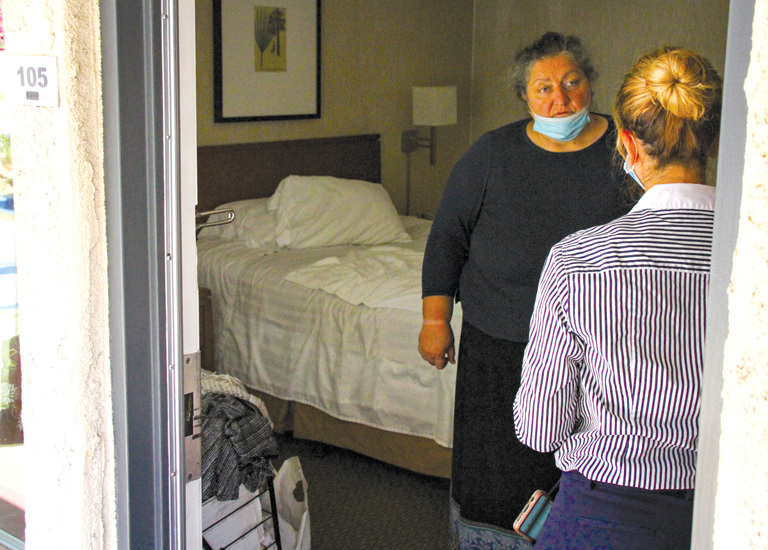
Project Room Key guest Mariam Tovmasian (facing forward) talks to Ivet Samvelyan, City of Glendale Community Services manager, outside her room.
Project Room Key brings life-changing experience to homeless.
By Mary O’KEEFE and Charly SHELTON
Homelessness has been a concern that has been very visible and yet is something that as a society many people have become accustomed to. The increasing number of tents under freeways has become familiar landmarks.
The COVID-19 pandemic has brought some long-needed attention to the homeless issues across the country and has made finding solutions a priority.
Ascencia is the City of Glendale’s lead coordinator for individuals who are homeless. Last week, CVW looked at some of the overarching things that it does to help provide aid to the homeless of Glendale and how it works to end each person’s homelessness on a case-by-case basis through individual casework, outreach and support. This week, CVW looks at one of the specific programs that is used to help those most at-risk members of the homeless population in Glendale to get off the streets during the pandemic.
The City of Glendale has recently received $3 million in federal Emergency Solutions Grant funds to address the risk of homelessness, loss of housing and loss of employment of those impacted by COVID-19.
“Getting this money means people are recognizing homelessness as a nationwide challenge and we [in Glendale] are ready to combat this challenge,” said Ivet Samvelyan, Community Services manager.
With the new funding Samvelyan and her staff have been implementing new programs, including the hotel rental program, Project Room Key. This project leverages resources from the state of California, Los Angeles County and Los Angeles Homeless Services Authority [LAHSA] to rent unoccupied rooms in partner hotels to give those most at-risk homeless clients a safe place to go during the pandemic. This includes clients who have health issues, mobility issues or other factors that may make them a prime target for contracting COVID-19. Through this program, about 70 people have been taken off the street in Glendale and placed in hotel rooms.
“In our program we leverage services with Ascencia and our outreach teams provide meals to the clients,” Samvelyan said. “We have health checks, a nurse on staff to do health screenings. What we have done specifically a little more aggressively in Glendale is to assign housing navigators to work with each of these clients for the next level of housing because we are set to make sure no one will return to the streets after the program is completed, and hopefully the pandemic is over.”
Although this seems like a win-win for the many homeless in need of somewhere safe and clean during this pandemic, it is still a battle for some who may take issue with being housed again for any number of reasons.
“I still struggle with some of our clients who are not interested in the hotel programs,” Samvelyan said. “I had a conversation with a client as to why he was not interested in the hotel program. It has a lot to do with the mental health condition [of the homeless] and not [being] interested in following case management or [are reluctant] to ask for help.”
For those who do accept Ascencia’s offer to take part in Project Room Key, it becomes a life-changing opportunity. And, in many cases, a life-saving kindness.
“It is excellent; I mean you can’t even compare to the street. You sleep but there are a lot of strangers and stuff like that,” said Gevik Aghajani, who has been at the Vagabond Inn in Glendale for two months as a guest of Project Room Key. “A few times they robbed me, you know, they beat me up overnight. Drunk people do whatever they want to do to people. Anyway, I’m lucky that I survived [to make it] here. I’m very happy I’m here.”
Aghajani said that everyone has been fantastic, from the moment he entered the parking lot and the nurses checked his temperature to the case managers from Ascencia who bring lunch and check on the clients every day to the site manager, Lekendrick Richards from First to Serve Outreach Ministries, who is always there to ensure guests are taken care of. Despite health issues and other worries keeping him up at night, having a safe space to stay is transformative and helps Aghajani get his feet back on the road to recovery.
“As long as I know that this is my room, I am very happy,” Aghajani said. “After all, I [want to say] thank you [to everyone here and at Ascencia] for the help they’ve given me, and I really appreciate it. Thank you very, very much.”
